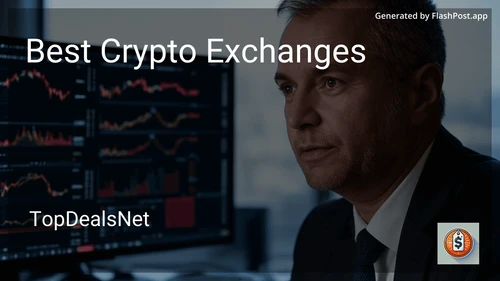Best Crypto Exchanges in January 2026

Binance
- Large selection of cryptocurrencies
- High liquidity
- Advanced trading features
- Mobile app available
- Low trading fees
- Staking and lending options

Coinbase
- User-friendly interface
- High security standards
- Supports multiple fiat currencies
- Educational resources for beginners
- Advanced trading platform (Coinbase Pro)
- Insurance for digital assets in hot storage

Kraken
- Wide range of supported cryptocurrencies
- High security measures
- Margin and futures trading
- Competitive fees
- Advanced trading tools
- 24/7 customer support

Bitfinex
- Wide range of cryptocurrencies and tokens
- Advanced trading options (margin, derivatives)
- High liquidity
- Customizable interface
- API for automated trading
- Staking and lending services

KuCoin
- Extensive selection of cryptocurrencies
- Low trading fees
- Staking and lending features
- Futures and margin trading available
- User-friendly interface
- Mobile and desktop applications

Gemini
- Strong security protocols
- Regulated and compliant with US laws
- User-friendly design
- Supports fiat conversion
- Insured hot wallets
- Advanced trading platform (ActiveTrader)
In the ever-evolving world of cryptocurrency, selecting the right crypto exchange is crucial for both beginners and veteran traders. The choice of exchange impacts your trading experience, security, and even the fees you'll pay. This guide breaks down the essentials of choosing a crypto exchange, providing insights into what makes a platform suitable for your needs.
Understanding Cryptocurrency Exchanges
Cryptocurrency exchanges are platforms that facilitate the buying, selling, and trading of digital assets. These platforms can vary significantly in terms of features, security, fees, and supported cryptocurrencies. Generally, crypto exchanges can be classified into two categories: centralized exchanges (CEXs) and decentralized exchanges (DEXs).
-
Centralized Exchanges (CEXs): These are platforms managed by centralized organizations and are responsible for holding users' funds. Known for their user-friendly interfaces and extensive range of features, CEXs cater to both novice and professional traders. However, they can be more vulnerable to hacks given that they manage large amounts of crypto.
-
Decentralized Exchanges (DEXs): Unlike CEXs, DEXs operate without a central authority and allow users to trade directly with one another. This peer-to-peer approach enhances privacy and security, but can be complex and typically features fewer trading pairs.
Key Factors to Consider When Choosing a Crypto Exchange
Choosing the right exchange requires careful scrutiny of several critical factors to ensure that the platform aligns with your trading goals and priorities.
Security and Trustworthiness
The safety of your funds should be your top priority. Look for exchanges that have robust security measures like two-factor authentication (2FA), cold storage of funds, and insurance policies. Research the history of the exchange for any past security breaches and how they were handled.
Supported Cryptocurrencies
Consider the diversity of cryptocurrencies available on an exchange. If you're looking to trade specific altcoins or newer tokens, ensure that they are listed on the platform. A diverse selection can provide more trading opportunities and convenience.
Fees and Commissions
Understand the fee structure of each exchange. Some platforms charge lower maker or taker fees, while others may have deposit or withdrawal fees. It's essential to calculate the potential costs based on your trading volume and frequency.
User Experience and Interface
The usability of an exchange can greatly affect your trading experience. Opt for exchanges with intuitive interfaces and mobile applications if you plan on trading on-the-go. A seamless user experience can help you execute trades quickly and efficiently.
Liquidity
Liquidity is crucial for executing trades quickly and minimizing the risk of price slippage. High liquidity means you're more likely to complete large trades without adversely affecting the market price. Check the trading volumes of the exchanges you are considering.
Regulatory Compliance
Ensure that the exchange complies with relevant regulations in your jurisdiction. This compliance indicates legitimacy and enhances trust. Additionally, adherence to regulations often ensures a higher standard of security and operational transparency.
Customer Support
Reliable customer support can be a lifesaver when issues arise. Evaluate the available support options, such as live chat, email, and phone support. Quick response times and helpful assistance improve the overall user experience.
Types of Trading Available
Different exchanges offer various types of trading such as spot trading, margin trading, and futures. Select an exchange that offers the type of trading you're interested in, considering the risks and potential rewards of each.
In the fast-paced crypto world, choosing the best cryptocurrency exchange is no small task. By evaluating security, supported currencies, fees, and more, you can make an informed decision that aligns with your trading strategy and personal preferences. As the crypto space continues to grow, staying informed and vigilant will help you navigate this exciting financial frontier successfully.
